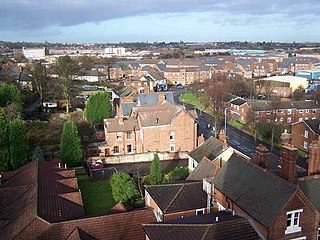Related Research Articles

West Midlands is a metropolitan and ceremonial county in the larger West Midlands region of England. A landlocked county, it is bordered by Staffordshire to the north and west, Worcestershire to the south, and is surrounded by Warwickshire to the east. The largest settlement is the city of Birmingham.

The Black Country is an area of England's West Midlands. It is mainly urban, covering most of the Dudley and Sandwell metropolitan boroughs, with the Metropolitan Borough of Walsall and the City of Wolverhampton sometimes included. The towns of Dudley and Tipton are generally considered to be the centre.

Dudley is a market town in the West Midlands, England, 6 miles (9.7 km) southeast of Wolverhampton and 8 miles (13 km) northwest of Birmingham. Historically part of Worcestershire, the town is the administrative centre of the Metropolitan Borough of Dudley. In the 2011 census, it had a population of 79,379. The Metropolitan Borough, which includes the towns of Stourbridge and Halesowen, had a population of 312,900. In 2014, the borough council adopted a slogan describing Dudley as the capital of the Black Country, a title by which it had long been informally known.

Tipton is an industrial town in the metropolitan borough of Sandwell, in the county of the West Midlands, England. It had a population of 38,777 at the 2011 UK Census. It is located northwest of Birmingham and southeast of Wolverhampton. It is also contiguous with nearby towns of Darlaston, Dudley, Wednesbury and Bilston.

The West Midlands conurbation is the large conurbation in the West Midlands region of England. The area consists of two cities and numerous towns: to the east, the city of Birmingham, along with adjacent towns of Solihull and Sutton Coldfield; and to the west, the city of Wolverhampton and the area called the Black Country, containing the towns of Dudley, Walsall, West Bromwich, Oldbury, Willenhall, Bilston, Darlaston, Tipton, Smethwick, Wednesbury, Rowley Regis, Stourbridge and Halesowen.

The Metropolitan Borough of Dudley is a metropolitan borough of West Midlands, England. It was created in 1974 following the Local Government Act 1972, through a merger of the existing Dudley County Borough with the municipal boroughs of Stourbridge and Halesowen.

Brierley Hill is a town and electoral ward in the Metropolitan Borough of Dudley, West Midlands, England, 3 miles (4.8 km) south of Dudley and 1 mile (1.6 km) north of Stourbridge. Part of the Black Country and in a heavily industrialised area, it has a population of 13,935 at the 2011 census. It is best known for glass and steel manufacturing, although the industry has declined considerably since the 1970s. One of the largest factories in the area was the Round Oak Steelworks, which closed down and was redeveloped in the 1980s to become the Merry Hill Shopping Centre. Brierley Hill was originally in Staffordshire.

Birmingham, a city and metropolitan borough in the West Midlands, England, is the second-largest city in the United Kingdom.

Darlaston is an industrial and market town in the Metropolitan Borough of Walsall in the West Midlands of England. It is located near Bilston, Walsall, Wednesbury, West Bromwich, Willenhall and Wolverhampton. It was historically part of Staffordshire.

Transport for West Midlands (TfWM) is the public body responsible for co-ordinating transport services in the West Midlands metropolitan county in England. It is an executive body of the West Midlands Combined Authority (WMCA), with bus franchising and highway management powers similar to Transport for London. TfWM's policies and strategy are set by the Transport Delivery Committee of the WMCA.
The West Midlands region straddles the historic borders between the counties of Warwickshire, Staffordshire in the north, and Worcestershire in the south.
Simon Francis Murphy is a British charity executive and former politician who was a Labour Member of the European Parliament (MEP) from 1994 to 2004.

In England, local enterprise partnerships (LEPs) were voluntary partnerships between local authorities and businesses, set up in 2011 by the Department for Business, Innovation and Skills to help determine local economic priorities and lead economic growth and job creation within the local area. They carried out some of the functions previously carried out by the regional development agencies which were abolished in March 2012. In certain areas, funding was received from the UK government via growth deals. Funding for LEPs was withdrawn by the Rishi Sunak Conservative government in April 2024 and their functions were assumed by local authorities, some of whom have formed Business Boards as replacements.
The Greater Birmingham & Solihull Local Enterprise Partnership (GBSLEP) was one the Local Enterprise Partnerships set up by UK Government to drive economic development in England.
The South East Midlands Local Enterprise Partnership (SEMLEP) was established in 2011, and was one of 39 Local Enterprise Partnerships set up by the UK Government to drive economic development in England. The SEMLEP geographical region includes 36 enterprise and innovation centres, and five universities. Its board was made up of representatives from the public and private sectors, in addition to skills providers.
Healthcare in the West Midlands was, until July 2022, the responsibility of five integrated care groups: Birmingham and Solihull, Sandwell and West Birmingham, Dudley, Wolverhampton, and Walsall.

The West Midlands Passenger Transport Executive (WMPTE) was the public body responsible for public transport in the West Midlands metropolitan county in the United Kingdom from 1969 until 2016. The organisation operated under the name Centro from 1990, and was publicly branded as Network West Midlands from 2005.

The West Midlands Combined Authority (WMCA) is the combined authority for the West Midlands metropolitan county in the United Kingdom. It was established by statutory instrument under the Local Democracy, Economic Development and Construction Act 2009. It is a strategic authority with powers over transport, economic development and regeneration. The authority formally came into being on 17 June 2016.

The inaugural West Midlands mayoral election was held on 4 May 2017 to elect the Mayor of the West Midlands, with subsequent elections to be held every four years from May 2020. The election took place alongside five elections for English metro mayors and other local elections, and ahead of the general election on 8 June 2017.
References
- ↑ "Black Country LEP - About us". Black Country LEP. 2020. Archived from the original on 29 July 2020. Retrieved 25 February 2024.
- ↑ Henderson, Steven R. (12 November 2013). "From Sub-Regional Networks to Sub-Regional Localism: Experiences of Collaboration in England's Historical Black Country". Regional Studies. 49 (9): 1497–1513. doi:10.1080/00343404.2013.845655.
- ↑ Courser, John (28 June 2023). "Consortium made region wealthier over quarter of a century". Express and Star. p. 24. ProQuest 2830030781.
- 1 2 "WMCA to continue to support business growth in West Midlands following the closure of LEPs". M2 Presswire; Coventry. 4 April 2023. ProQuest 2794524592.
- ↑ "New support network will help businesses survive and thrive: Mayor Andy Street explains how the combined d authority has taken on the lead role in supporting business growth". Express and Star. 10 April 2023. p. 6. ProQuest 2798535843.